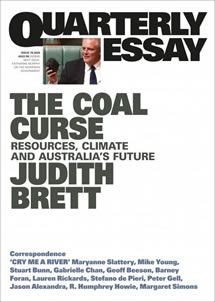Reviewed by Rama Gaind.
By Judith Brett, Black Inc./Quarterly Essay, $29.99.
 “Faced with the crisis of a global pandemic, for the first time in more than a decade Australia has had evidence-based, bipartisan policy-making. Politicians have listened to the scientists and … put ideology and the protection of vested interests aside and behaved like adults. Can they do the same to commit to fast and effective action to try to save our children’s and grandchildren’s future, to prevent the catastrophic fires and heatwaves the scientists predict, the species extinction and the famines?”
“Faced with the crisis of a global pandemic, for the first time in more than a decade Australia has had evidence-based, bipartisan policy-making. Politicians have listened to the scientists and … put ideology and the protection of vested interests aside and behaved like adults. Can they do the same to commit to fast and effective action to try to save our children’s and grandchildren’s future, to prevent the catastrophic fires and heatwaves the scientists predict, the species extinction and the famines?”
Emeritus Professor of Politics at La Trobe University Judith Brett, who has edited QE#78, delivers a perceptive essay about leadership, vision and history. She scrutinises the costs of Australia’s coal addiction and asks, where will we be if the world stops buying it?
Traced is the unusual times gone by of Australia’s economy and the “resource curse” that’s shaped our politics. Being a historian, Brett admits to looking for explanations not just in the “perfidies of the preset, but in the decisions and events of the past”.
Australia is a wealthy nation with the economic profile of a developing country – heavy on raw materials, and low on innovation and skilled manufacturing. Once we rode on the sheep’s back for our overseas trade; today we rely on cartloads of coal and tankers of LNG.
History does matter, but it does shift our attention from the contingencies of events and personalities to structures and institutions. It’s an essay about the times past of Australia as a commodity-exporting nation and its political consequences.
“Economic history is unfashionable nowadays. Economists focus on the modeling and management of the present and historians are more interested in stories and experience, and in uncovering diversity and neglected voices. Economic history is dry and hard to narrativise. But how a country makes its living can explain a lot.”


